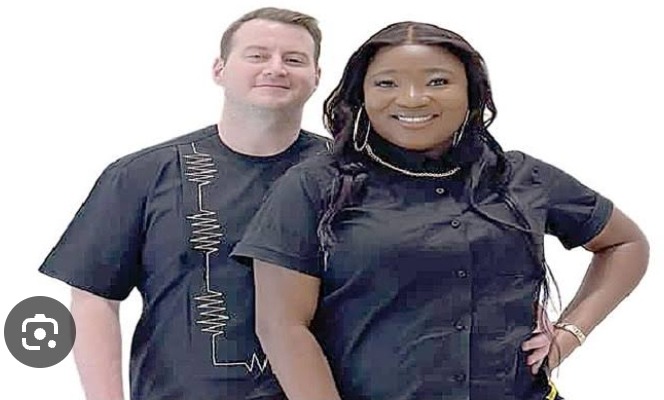
According to Punch, Aaron Price, a 33-year-old American citizen born in California and now living in Utah, is seriously considering relocating to Nigeria with his Nigerian wife, Blessing, whom he met during the height of the COVID-19 pandemic in 2020. Their romance blossomed through a faith-based dating app, culminating in a relationship built on shared values and deep mutual admiration. Although the first date nearly ended things, Price managed to convince Blessing to give him another chance, and it quickly became clear to him that she was the woman he wanted to spend his life with.
He said, “I persuaded her and honestly, even within a few weeks, I knew I wanted to marry her.”
Now married, the couple lives in Utah, where Price works in software sales after transitioning from a career as a professional musician. He also frequently appears in his wife’s content on TikTok, although he describes himself as a “content creator by force,” dragged into it by Blessing’s enthusiasm for sharing their cross-cultural journey online.
It was during this visit that Price began reflecting more seriously on the idea of living in Nigeria permanently. In his quest to understand the process of becoming a Nigerian citizen, he discovered that foreign men married to Nigerian women are required to live in the country for 15 years before being eligible for naturalisation. In contrast, foreign women who marry Nigerian men are often granted citizenship much more easily. Price expressed surprise and concern about this disparity, describing it as a form of gender-based inequality that undermines Nigerian women’s rights.
Despite the lengthy requirement, Price said he’s willing to take on the challenge. While they’re not ready to move just yet, he and Blessing have talked extensively about the idea and hope to raise their future children in an environment where they can connect deeply with their mother’s culture. If he can continue working remotely for his American employer, he views the transition as not only feasible but deeply meaningful.
What attracts him to life in Nigeria is not just the culture but the vibrant sense of community and values he witnessed during his stay. He was especially touched by the friendliness and hospitality of the locals, who showered him with attention and curiosity, even though he considers himself a “nobody.” The food was another highlight—he fondly recalled enjoying rice dishes, various traditional soups, akara, and especially suya, which he said quickly became his favorite.
Though his understanding of Nigerian Pidgin is still developing, Price has picked up many phrases just by listening to Blessing speak with her friends. His goal is to become fluent enough to hold private conversations with his wife in public—especially when they’re abroad. He also expressed admiration for Blessing’s linguistic abilities, noting how she comfortably switches between English, Efik, Akwa Ibom, and her native dialect.
On the topic of “japa,” the Nigerian term used to describe the mass migration of citizens seeking better opportunities abroad, Price offered a candid perspective. While he acknowledged that countries like the U.S. offer strong economies and job opportunities, he cautioned that life overseas is not always as easy as it appears. Many immigrants, he explained, end up trapped in a cycle of financial stress, without savings or long-term stability, despite years of hard work.
